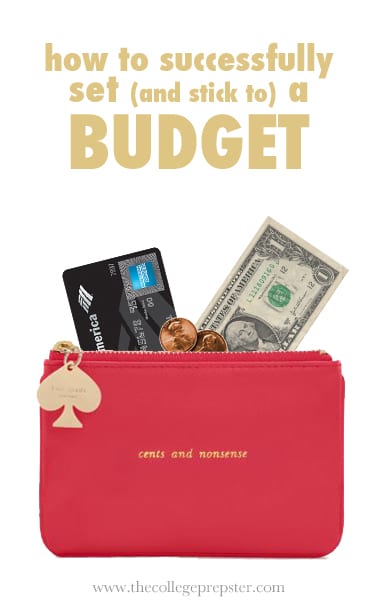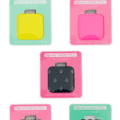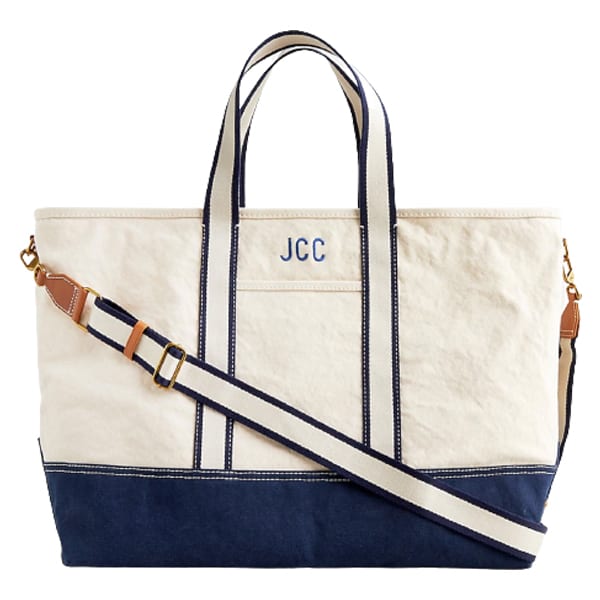I’ve been getting emails requesting for me to write a post about how to organize, set, and stick to a budget. Two problems with this. The first is that I don’t feel comfortable sharing my personal finances on here… and the second is that budgeting significantly differs for everyone. I’ve seen “downloadable” budgets, but… it’s really challenging to personalize. And when it comes to budgeting, personalization is KEY.
ONE | Determine priorities
As with, well, just about everything in life, it’s all about priorities. Some people are would rather live in a smaller apartment and have more money for “going out” on the weekends. Maybe you’d be willing to go out to restaurants fewer times a week so that you have more money for cab rides. It’s completely up to you. Whatever your priorities are, however, make sure you value what the consequences might be. Unless you have a completely unlimited income (in which case, I’m jealous), having more of one thing will mean having less of another. Note: It’s totally okay for you to prioritize going shopping over paying back student loans… just realize that this means having the loans accumulating even more over the years.
To give you an idea of my priorities: I wanted a one bedroom vs. a studio, so I have less extraneous spending money. I have a monthly “saving” goal, which means I can’t eat out for dinner as often as I would like to. I want to be able to buy clothes as needed (or sometimes even wanted), so I take the subway whenever possible to avoid cab fares!
TWO | Document all income and expenses
This is really one of the most difficult parts. If you’re moving or switching jobs or have never gone through this exercise before, you should be prepared to take a couple of months to really get down to a little margin of error. When I first moved, I had to create a lot of placeholders based on educated guesstimates. (I wasn’t sure how much I would quite need for groceries. I didn’t know how often I would be “going out” on the weekends, or eating out, or taking cabs. I wasn’t sure how much my utilities would specifically be, etc.) After a month or so I had a good idea of what exactly I would be spending.
Make a giant list of all of your expenses. Rent, transportation, insurance, utilities, groceries, restaurants, coffee shops, alcohol, clothing, student loans, etc. I found that keeping a running tab on a legal pad was the easiest. Then I’d go through and plug the expenses into an Excel document and “categorize” them. I have lots of Excel experience so my document was pretty intense, but it really can be as simple as a keeping track with paper and a calculator! To make things easier for step three, I also gave each itemized expense an additional tag of “avoidable” and “unavoidable.” Obviously (and unfortunately haha) rent is unavoidable. But some of my dinners out were unavoidable (with friends) and some were avoidable (laziness about cooking).
Don’t forget about your income!!! I have two sources of income… my company and my job. My job is a salary so I know exactly how much I get every month. However, with my company it fluctuates. I do have a pretty good idea of what the minimum amount I get a month. I stick with that number and assume that everything above that is a bonus and goes directly into savings. This, again, is totally going to be quite different for every individual person.
Once you know what your income and expenses are, you can move on.
THREE | Set Goals & Limits
Start with your income. If it’s a fixed income, you’re pretty much set. If it’s not a fixed income, make a good guess. (When in doubt, assume that you’ll make the smallest amount. Better to end up with extra than to come up short at the end of the month!)
Immediately subtract all of your big expenses. For this you can choose to include or to not include all of your unavoidable expenses (like dinners with friends, etc.). I tend to wait and include those types of unavoidables within each category.
Somewhere within this step, you should set your goal of savings. For all intents and purposes, I pretend that any money I want to save simply does not exist. I can’t think about the money, because buying those ballet flats or going out to dinner every night is way too tempting otherwise! If it “doesn’t exist” there’s nothing to spend. Along the same lines as savings (but not as longterm), it’s a good idea to also have an “unexpected expense” category for money you can dip into should you need to purchase plane tickets or cover the expense of a flat tire, etc.
This gives you a number that you can work with, experiment with, and ultimately manipulate when setting your budget. Since you took a month or so to document your expenses, you should have a good idea of what your big categories are. Use your best judgement to set limits on each category. Here’s a hint: refer back to your priorities!!! If your priority is money for bars and cabs on the weekends, make sure you’ve given yourself the leeway to do so! If your priority is shopping, make sure you give the proper allowance for that.
As long as your budgeting for your priorities, you will set yourself up for success. Money is often a source of stress for people, but if you listen to your heart (and have self control when necessary, see #4) you will be set up for success. Don’t set yourself up for failure by setting budgets that are unreasonable or simply not you! I think budgeting is a lot like dieting. If you restrict yourself of all the things you love, you’ll either be super depressed all the time or upset with yourself if you break it. It’s all about moderation and working with a program that works for YOU and with YOUR lifestyle.
FOUR | Come up with a system
You should have a system to track your spending and income. It can be anything, it’s totally up to you. Examples:
– Going to the bank and taking out all the cash you have allowed yourself to spend for the month. Divide the cash up into envelopes depending on the category: coffee, gas/cab money, clothing, etc. (Note: please be careful with this. Carrying huge sums of money on your person is just not the safest.) If you have cash left over in any envelop, you can: add all the sums into a general “rainy day” or “vacation” savings account, carry the money over into next month, save half and carry over half, etc. It’s all about what you want.
– Using an online service (like Mint.com) to track your spending.
– Saving receipts and recording your daily spending into an Excel spreadsheet. If you’re using Excel, make sure you set your cells’ formulas to deduct from your goal/limit so you know how much you have remaining for the month.
– Set “daily” limits. Easiest to keep track of on a day to day basis (e.g. I spent $45 of my allotted $60), but quite complicated when it comes down to knowing what you spent on what. This is also not ideal for bigger purchases, like furniture, major grocery shopping trips, and clothing buys.
Those are just some examples to give you an idea of what you can do for a system.
Here’s what I do: I only use a credit card (some people spend more with cards, but cash is feels way too liquid for me) for purchasing nearly everything. That way, I can link my accounts to Mint.com and keep track of my spending online. Mint.com lets you set your budgets and categories and gives you updates (alerts even on the iPhone app) when you’re close to the limit! And, because I’d be too paranoid without, I do carry a certain amount of cash with me, but it’s pretty much only for emergencies (read: credit card minimums and cabs that don’t take credit cards). I also pay off my credit card balance in full every month so it’s not like I’m buying things “on credit.”
FIVE | Stick to it!
If you budgeted to fit your needs and wants (remember those priorities!), you should be all set. But, I know all too well that life can be oh so tempting. You really should trust your system and trust yourself to stay within your budget. It’s a budget for a reason and sacrifices are quite likely. One of the hardest things is when your friends want to go to an expensive restaurant or something like that. Don’t feel guilty suggesting another, more reasonable choice. (I’m going to guess that someone else in the group was probably stressing about how they wouldn’t be able to afford groceries that week!)
Remember that you can seriously make it work. You really can! You may not be able to spend six dollars on your way to work every morning for a grande peppermint mocha and a scone (that’s $120/month!)… but once a week on Friday mornings might totally work for you!










Great post, Carly! I totally agree that setting a budget is a very personal task.
I started by hoarding receipts, entering them into Excel {I HATE Excel} and adjusting my spending from there. $200 a week on eating out?! $75 a week (life of a pre-med) on coffee?! Those needed to be cut, so I've replaced eating out with Whole Foods, Trader Joe's, and coupons. I nixed Starbucks 5 days a week and go to Dunkin Donuts 2 days a week instead. It was an adjustment, but definitely worth the savings and health benefits of cooking at home.
xoxo
Yes! Great post. Budgeting is sooo important and so often ignored by young professionsals (especially by women). My parents taught me to "pay yourself first" which means to prioritize saving. It's so so beneficial to start saving now and saving smartly. Thanks for addressing this!
I love Mint! My husband and I use it and we've been able to cut out the incidental spending so we could pump up our savings account. Awesome program and it's FREE!
Thanks for this, Carly! This is awesome. I literally have just been thinking about budgeting – I'm in college and living in the dorm, so I have few expenses, but I definitely need to work on budgeting the money I'm spending!
This is an amazing post. Thank you so much for all the tips. :] This definitely helped.
oooh i love personal finance! great post! my suggestion – there are lots of apps that work like check registers for people who don't like excel. my favorite is YNAB which i am OBSESSED with. (this isn't an ad i swear haha!) you make your budget then can enter each purchase into the app as you buy something. it deducts the amount from your budget category (ie "groceries") & you can see how much is left for the month. so easy and i've saved SO much money because i didn't realize how much money i was wasting eating out before i started using it! it's also so important to work to make a realistic budget. if you know you're going to go to starbucks three days a week, then budget for it!! lots of people fail because they try to make their budgets way too strict at first then are frustrated when they can't stick to them.
Thank you for providing that app! I am going to look into has I have been told to make a budget especially after recently moved in into my apartment.
Hanny
I also have an intense Excel spreadsheet and usually I'm really good at sticking to a budget. It's very informative to write down everything you are spending and why. These are great tips for getting started budgeting!
The taking out all the cash you allow yourself for the month is probably better for most people. But, girls are so weak when it comes to going to a store 🙂
http://theworkette.blogspot.com/
Thank you C for posting this great post. I have been told by my accounting professors to make a budget, especially when you live on your own. It's easier and also shows you were your weaknesses are.
starting this week I will making my spreadsheet or use budget app.
♥
Hanny
Great post and great tips! To control my coffee purchases (which I had noticed were getting out of hand), I put money onto my Starbucks card on the 1st of each month and it is a set amount. If I run out of money before the next month, then I do without and just take coffee brewed from home. It's a small way to pace yourself!
The only thing I would add to this is to make sure and start saving for retirement NOW, especially if your company does a 401(k) match or retirement savings match and put as much in as you can now because it means much more later!
Just what I needed!
I have a hard time documenting my expenses but I'm still working on that, this month at least I kept all the receipes at the same place organized by date plus a really simple word document (I'm really bad on excell) detailing my card debt and a small budget-like attempt detailing how much I need to buy on juice and fruits for my son, bread, etc, cat food, dog food, and it's starting to make sense.
My favorite part was #1 because I never really thought of that in depth… "having more of one thing will mean having less of another"… Totally!
I have recently started using mint, and I must say it is amazing! You can load all of your accounts onto it! I have my mortgage, my car loan, both of my savings accounts, HSA, checking, student loan, and credit card all rolled into one! It downloads everything from your online banking and categorizes it. You do have to do a little bit of editing, like it labeled a gas station I went to as fast food, but it is super easy! Best of all it is free!
Great post and great ideas! I'm definitely not skilled in the budgeting department, but I've found that online sites like eMoney and Mint.com do wonders for tracking expenses. Makes it much easier to track how much you're spending…or over-spending per category.
Love, Steph
http://www.stephanieziajka.blogspot.com
Great suggestions, Carly! Thanks for sharing. I'm very guilty of not budgeting, but this makes me want to start.
Just found this, your site is great but I just recently found this particular entry. My dad uses Quicken for home and small businesses and now that is what I use but those apps you listed are great. I do what you do about only carrying minimum cash and charging everything but paying it off at the end of the month. More people need to know these simple skills about budgeting and spending responsbiltiy.
I don't suppose you'd want to make a Google Doc of that handy dandy Excel spreadsheet so I could use it? 🙂
I'm reposting this on my blog and linking it back to you. This is some FABULOUS ADVICE 😀 Thanks so much for sharing your wisdom and recommendations!
Hi Carly, now that you are in NY for over a year – do you still use the same system? An update post would be awesome! 🙂 xx
Doing a budget helps you get off the treadmill of living from one pay packet or payment to the next. It enables you to sort out your money priorities and find the right balance between spending and saving.
irene (Website info on Captain Joe Fishing Charter Skagway Alaska)
Wow, this article is really very good, so that I can't say how happy feeling. The article make every detail of the story depicts streaming with the best, and every movement of the characters all write so lifelike, let me see the waves excited. weight loss calculator app for iphone
I like how you didn't just write a fix-all budget piece. We definitely all budget different and it all works different, but I like how you have general, yet specific, ways to make a budget and how to stick to it!
You know your projects stand out of the herd. There is something special about them. It seems to me all of them are really brilliant!
Financial Consutant online
Where did you get that zippered pouch? Are they available online like that?
Set the budget is very important for every filed of life. Specially when a family wants to purchase a house then maintain the budget is very difficult. mortgage rates vancouver